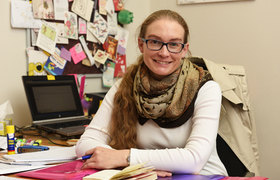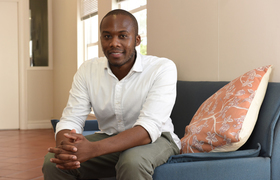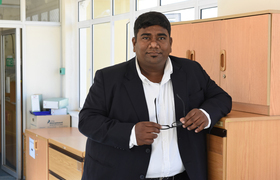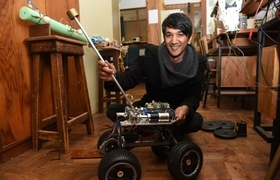Creativity key to ensuring energy supply
14 December 2017 | Compiled Kate-Lyn Moore. Photo Robyn Walker.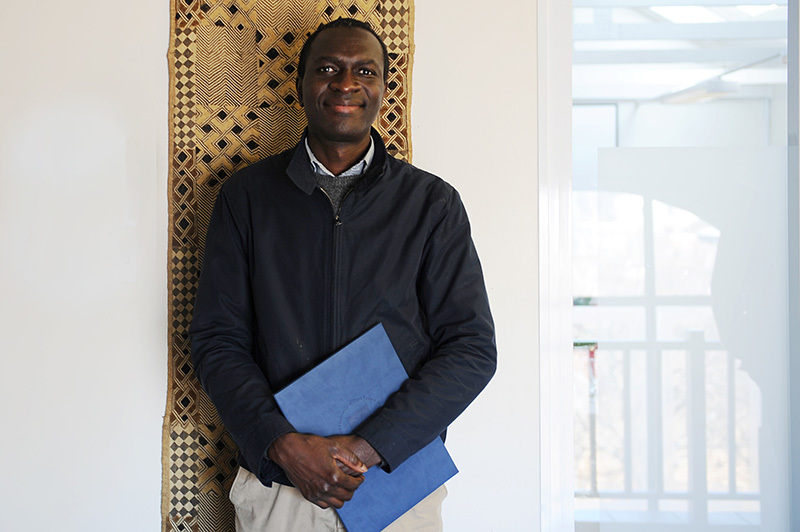
Associate Professor Adeniyi Isafiade has made strides in ensuring that the networks bringing us crucial resources, such as energy and water, are as efficient, cost-effective and environmentally friendly as possible.
But it was for his attempts at integrating renewable energy into these networks that Isafiade was honoured with a 2017 Claude Leon Award. Isafiade speaks to Kate-Lyn Moore from the UCT newsroom.
What drew you to chemical engineering?
I was drawn to chemical engineering by the passion I have for science and technology as a whole.
Please describe your academic journey. How did you come to be at UCT, as an associate professor of chemical engineering?
I have a BSc in industrial chemistry and an MSc in chemical engineering from the universities of Ilorin and Obafemi Awolowo, both in Nigeria. What actually brought me to UCT was an offer of a partially funded PhD opportunity in chemical engineering, which came through my (now late) PhD supervisor.
After completing the PhD, I worked as a Claude Leon Postdoctoral Fellow for close to two years, after which I was employed as a full member of the Department of Chemical Engineering’s academic staff.
Please tell us about your research focus.
I have actually been working, in terms of research, in the area of process synthesis and optimisation of energy and water supply networks. In the area of teaching, I have been involved in fluid mechanics, heat transfer, process dynamics and control, as well as process safety.
My research in the area of process synthesis and optimisation of energy and water supply/usage networks entails developing mathematical models that can be used to represent as many possible options of different networks that meet energy and water demand in a cost-effective and environmentally friendly way.
The resulting superstructure models are usually optimised in a specialised solver environment known as a General Algebraic Modelling System.
Which research of yours does the Claude Leon Merit Award recognise? How does the award support your research?
The area that was recognised is the aspect that involves integrating renewable energy into regional energy demand and supply networks.
The award has gone a long way in supporting my research in that I have used part of it to present a paper at a recently concluded conference on energy optimisation and pollution reduction in Tianjin, China.
I will also use the award to pay my research and administration assistant, who has been very instrumental in the management of my research portfolio.
Is the recognition that the Claude Leon award brings important to an early career academic?
Yes, the recognition is very important for an early career researcher, not only in the aspect of the financial reward that enhances further research, but also in the aspect of the recognition, which is highly motivating in pushing an early career researcher to be more productive.
What floats your boat in research?
My postgraduate students, who are very productive, and the nature of my research, which mostly requires creativity in setting up and solving supply chain models, and this is what I like doing.
What do your academic responsibilities entail besides research?
They entail lecturing undergraduate chemical engineering courses, supervision of postgraduate students and admin work within the department.
What do you wish other people knew about your field of research?
The fact that my research plays a key role in helping government, the community and other stakeholders make informed decisions on energy, material resources and water network supply issues.
What do you like doing off duty?
Spending time with my family, participating in church activities and cycling.
How does your area of research fit in with your personal interests?
I like the fact that creativity is required in being able to set up integrated supply networks that are cost optimal and environmentally friendly.
 This work is licensed under a Creative Commons Attribution-NoDerivatives 4.0 International License.
This work is licensed under a Creative Commons Attribution-NoDerivatives 4.0 International License.
Please view the republishing articles page for more information.







